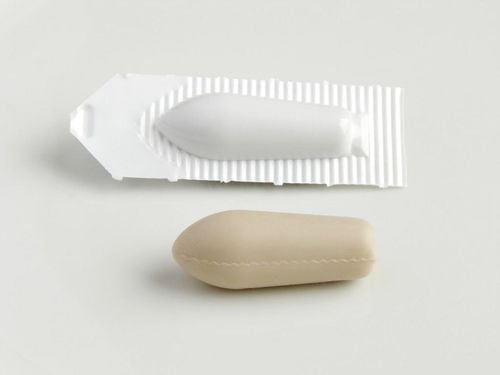1. What is Glucophage 1000mg?
Glucophage 1000mg is primarily used to treat type 2 diabetes mellitus that is not insulin-dependent, especially in patients with obesity who do not achieve adequate blood glucose control through diet and exercise. The medication is formulated as extended-release tablets with an oval shape, two convex sides, and a score line, one side of which is embossed with the number "1000".
Glucophage 1000mg is manufactured by Merck Santé, the packaging comes in a box containing 2 blister packs of 15 tablets, with the following ingredients:
• Active ingredient: Metformin hydrochloride, equivalent to 1000mg.
• Excipients: Magnesium stearate, hypromellose (hydroxypropyl methylcellulose 2208), carmellose sodium (sodium carboxymethylcellulose).
2. Indications and uses of Glucophage 1000mg
2.1. Indications of Glucophage 1000mg
Glucophage 1000mg is commonly prescribed by doctors for the following cases:
• Treatment for individuals with type 2 diabetes, and can be used in combination with regular physical exercise and a proper diet.
• It may be used alone or in combination with insulin, other medications, or dietary supplements for individuals aged 10 and older with type 2 diabetes.
• It is considered a treatment option when dietary management alone does not achieve the desired effect, helping individuals with type 2 diabetes improve and significantly reduce complications associated with the condition.
2.2. Uses of Glucophage 1000mg
The active ingredient metformin hydrochloride in Glucophage 1000mg is a biguanide that helps lower blood glucose levels by reducing the absorption of glucose in the intestines, while also promoting glycogen synthesis in the liver, inhibiting gluconeogenesis, and enhancing insulin activity. As a result, blood glucose levels are significantly reduced with a lower risk of complications.
Additionally, metformin also affects cells by increasing glycogen synthesis. In addition to lowering blood glucose concentrations, it supports the metabolism of lipids in the body, making this process smoother and more efficient.
The absorption rate of metformin in the body is relatively slow and may be influenced by food. The drug is rapidly distributed into body fluids and tissues, with a small amount entering red blood cells. Metformin is primarily excreted unmetabolized through urine. Its renal clearance is usually greater than 400 mL/min, but it may be reduced in patients with renal impairment.
3. Dosage and Administration of Glucophage 1000mg
3.1. Dosage of Glucophage 1000mg
In general, there is no fixed dosing regimen for the use of Glucophage 1000mg in patients with type 2 diabetes. The dosage of Glucophage XR will be determined based on the individual's medical condition and tolerance to the medication. However, the maximum recommended daily dose should not exceed 2000mg.
It is also recommended that patients take Glucophage 1000mg once daily with the evening meal. The treatment should begin with a lower dose, which can then be gradually increased to reduce gastrointestinal side effects and help determine the minimum effective dose for optimal blood glucose control. Below are the specific doses of Glucophage 1000mg for different patient groups:
• For adults: The usual starting dose is 850mg per dose, taken 2-3 times per day, with a maximum of 3g per day.
• For children aged 10-17 years: The starting dose is 500mg or 850mg per dose, taken once daily, with a maximum dose of 2g per day.
In cases where Glucophage 1000mg is used in combination with insulin to control blood glucose, the following recommended dosing regimen can be followed:
• Starting dose of Glucophage is 500mg per dose, once daily (taken with the evening meal).
• Adjust insulin dose based on the patient’s blood glucose readings.
• Increase the Glucophage dose to 1000mg per dose, once daily after adjusting the insulin dose.
To determine the treatment response to Glucophage 1000mg and identify the minimum effective dose for individuals with type 2 diabetes, blood glucose levels should be monitored, especially fasting blood glucose, during the initiation and dose adjustment phases. Patients should have their HbA1c levels checked approximately every 3 months. Low-dose monotherapy with Glucophage or combination therapy with insulin and sulfonylureas may help lower both HbA1c levels and fasting blood glucose to normal levels.
Additionally, monitoring HbA1c or blood glucose helps physicians identify primary failure (where the maximum recommended dose is insufficient to lower blood glucose) and secondary failure (where the blood glucose control target is no longer achieved after an initial period of effective treatment).
3.2. Administration of Glucophage 1000mg
Since Glucophage 1000mg is formulated in tablet form, patients should take the medication orally during or at the end of their evening meal. For doses prescribed twice daily, the patient may divide the dose into morning and evening administrations.
When taking the medication, it is important to swallow the tablet whole with water and not chew it, as this can help reduce or avoid gastrointestinal discomfort. Additionally, Glucophage should be taken consistently every day; patients should avoid skipping doses or discontinuing the medication without the doctor's advice.
4. Management of Overdose or Missed Dose of Glucophage 1000mg:
4.1. Management of Overdose of Glucophage 1000mg:
Taking more than 85g of metformin can lead to lactic acidosis, a severe metabolic complication that can be fatal if not treated promptly. Lactic acidosis occurs when a large amount of metformin accumulates in the body due to an overdose. According to statistics, this metabolic complication is most commonly observed in type 2 diabetes patients with renal impairment.
Typical symptoms of lactic acidosis include hypothermia, dyspnea, abdominal pain, and coma. Diagnostic findings typically show a decrease in blood pH, increased anion gap, elevated lactate/pyruvate ratio, and serum lactate levels greater than 5 mmol/liter. Due to its high risk, if any symptoms of lactic acidosis are noticed, the patient must immediately discontinue the medication and seek emergency medical care at the nearest hospital. The most effective treatment for metformin overdose and lactic acidosis is hemodialysis.
4.2. Management of Missed Dose of Glucophage 1000mg:
In case you miss a dose of Glucophage 1000mg, take the medication as soon as you remember. However, if it is almost time for your next dose, skip the missed dose and continue with your regular dosing schedule. Do not take a double dose or make up for the missed dose to avoid the risk of metformin accumulation in the body.
5. Contraindications for the Use of Glucophage 1000mg:
Here are some cases where Glucophage 1000mg should not be used:
• Allergic reactions to metformin hydrochloride or hypersensitivity to any of the excipients in the formulation.
• Diabetic ketoacidosis or pre-coma due to diabetes.
• Chronic kidney disease stage 3b (moderate), severe stages, or renal dysfunction (glomerular filtration rate < 45 mL/min/1.73 m²) or creatinine clearance < 45 mL/min.
• Acute conditions that may alter kidney function, such as shock, severe infection, or dehydration.
• Patients undergoing intravenous iodinated contrast administration.
• Conditions that can cause tissue hypoxia, such as myocardial infarction, shock, respiratory failure, or decompensated heart failure.
• Liver failure, alcoholism, or acute alcohol intoxication.
• Pregnant women with type 2 diabetes should only be treated with insulin, not metformin.
6. Some side effects when using Glucophage 1000mg:
During the use of Glucophage 1000mg, patients may experience some adverse drug reactions (ADRs) as follows:
• Very common ADRs: Patients may experience gastrointestinal disturbances, including diarrhea, nausea, vomiting, loss of appetite, or stomach pain. These side effects may occur when starting treatment with Glucophage 1000mg and typically subside over time. To minimize gastrointestinal symptoms, it is recommended to take the medication with or after meals, spaced out over 2-3 doses. Gradual dose escalation may also help improve gastrointestinal tolerance.
• Common ADRs: Symptoms of neurological disturbances and taste disorders may occur.
• Rare ADRs: In rare cases, Glucophage 1000mg may cause metabolic problems and nutritional disorders, such as lactic acidosis, reduced serum levels, or decreased absorption of vitamin B12 with long-term use. Additionally, patients may experience skin-related disturbances, such as urticaria (hives), rashes, and itching. Occasionally, hepatic disorders may appear, such as non-jaundiced hepatitis or abnormal liver function.
If any of these side effects occur after using Glucophage 1000mg, the patient should stop using the medication and immediately consult a specialist or visit a healthcare facility for proper diagnosis and management.
7. Which drugs does Glucophage 1000mg interact with?
When using Glucophage 1000mg with other medications, interactions or competitive phenomena may occur. Specifically:
• Alcohol: Increases the risk of lactic acidosis in cases of acute alcohol intoxication, especially in patients with liver dysfunction, malnutrition, or those on a restrictive diet.
• Iodine-containing contrast agents: Can cause renal failure, leading to the accumulation of metformin and increasing the risk of lactic acidosis.
• Certain drugs that increase blood glucose levels: Medications such as oral contraceptives, diuretics, and calcium channel blockers, when used in combination with Glucophage 1000mg, may result in blood glucose disturbances.
• Hypoglycemic drugs: May lead to excessive hypoglycemia, causing symptoms such as hypotension, dizziness, and fainting.
• Angiotensin-converting enzyme (ACE) inhibitors: Can lower blood glucose levels.
To avoid potential drug interactions, patients should consult their healthcare provider before using any additional substances or medications alongside Glucophage 1000mg.
8. Some considerations and storage instructions for Glucophage 1000mg:
8.1. Some considerations when using Glucophage 1000mg:
Before and during the use of Glucophage 1000mg, patients should be aware of the following considerations:
• Always check the expiration date, packaging, and quality of the tablets before starting treatment.
• Strictly follow the recommended dosage provided by your doctor. Do not alter the dose without medical advice.
• Follow the prescribed treatment plan thoroughly and do not discontinue the medication prematurely without consulting your doctor.
• Be cautious when operating machinery or driving, as there is a risk of hypoglycemia, especially if combined with other medications such as insulin, repaglinide, or sulfonylureas.
• Metformin should not be used to treat type 2 diabetes in women who are planning to become pregnant or are already pregnant. Insulin should be used to maintain blood glucose levels as close to normal as possible to minimize the risk of fetal abnormalities.
• Women who are breastfeeding should not use metformin, as it is excreted in breast milk. The decision to discontinue either the medication or breastfeeding should be based on the relative importance of the medication to the mother's health condition.
8.2. Storage instructions for Glucophage 1000mg:
Glucophage 1000mg should be stored in a dry place, at a temperature below 30°C, and protected from direct sunlight. It should be kept in a high, secure location, out of the reach of children and pets. Additionally, expired or damaged medication should be disposed of properly according to the guidelines provided by your doctor, and should not be discarded carelessly in toilets or drains.
Glucophage 1000mg is a medication used to treat type 2 diabetes, effectively lowering blood glucose levels and managing blood sugar control. To ensure optimal treatment outcomes and minimize the risk of side effects, patients should use the medication strictly as prescribed by their doctor.
To arrange an appointment, please call HOTLINE or make your reservation directly HERE. You may also download the MyVinmec app to schedule appointments faster and manage your reservations more conveniently.













